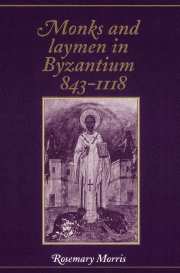Book contents
- Frontmatter
- Contents
- List of maps
- List of tables
- Acknowledgements
- Note on transliteration and citation
- List of abbreviations
- Introduction
- PART I FOUNDERS AND BENEFACTORS
- PART II PROTECTION AND SURVIVAL
- 6 Monasteries and the law
- 7 Fortune and misfortune
- 8 Territorial expansion and spiritual compromise
- 9 The challenge to central authority
- 10 The Komnene reaction
- Appendix: Imperial privileges to monasteries, c. 900–1118
- Bibliography
- Index
8 - Territorial expansion and spiritual compromise
from PART II - PROTECTION AND SURVIVAL
Published online by Cambridge University Press: 10 December 2009
- Frontmatter
- Contents
- List of maps
- List of tables
- Acknowledgements
- Note on transliteration and citation
- List of abbreviations
- Introduction
- PART I FOUNDERS AND BENEFACTORS
- PART II PROTECTION AND SURVIVAL
- 6 Monasteries and the law
- 7 Fortune and misfortune
- 8 Territorial expansion and spiritual compromise
- 9 The challenge to central authority
- 10 The Komnene reaction
- Appendix: Imperial privileges to monasteries, c. 900–1118
- Bibliography
- Index
Summary
The process of monastic land accumulation was not seriously hindered by Nikephoros Phokas' novel of 964, and this had profound consequences for the spiritual orientation of the monks in the more successful houses emerging during the late tenth and eleventh centuries. For with ever-increasing numbers came problems of management, efficiency and self-sufficiency. In solving these, the principle of eremia, although theoretically still of paramount importance, had, in practice, to be modified. The eleventh century saw the culmination of tendencies criticised in the tenth; many monasteries evolved into powerful economic units and their holders became increasingly influential figures. As a consequence, numbers increased and with this expansion came the need for greater supplies of foodstuffs. In addition, the evolution of many monastic houses from small locally based foundations to large property owning units means that the social relationships between such houses and their lay neighbours changed, very often for the worse. Donations from patrons allowed monastic interests a purchasing power and a pool of manpower unavailable to all but the richest lay landowners.
The eleventh century, in particular, reveals a series of paradoxes: the tension between the spiritual tenets of monasticism and the practical realities of survival; the theoretical honour in which monks were held by the laity contrasted with the extended and sometimes vituperative conflicts in which they often engaged with their secular neighbours and the lengths to which the heads of many houses were prepared to go to preserve their privileged economic and legal position – even to the extent of engaging in combat with imperial officials and making use of every advantage which their patronage networks afforded them – in clear opposition to the humility and obedience preached by their calling.
- Type
- Chapter
- Information
- Monks and Laymen in Byzantium, 843–1118 , pp. 200 - 240Publisher: Cambridge University PressPrint publication year: 1995



